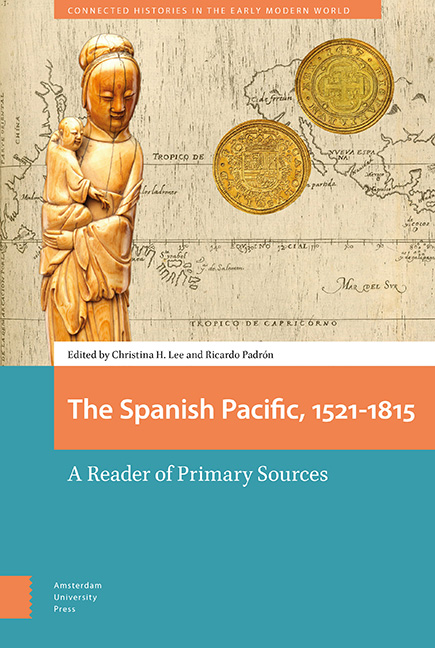Book contents
- Frontmatter
- Contents
- Abbreviations
- Acknowledgements
- Introduction
- 1 An Early Transpacific Account of the Spice Islands by Andrés de Urdaneta (1536)
- 2 Domingo de Salazar’s Letter to the King of Spain in Defense of the Indians and the Chinese of the Philippine Islands (1582)
- 3 Juan Cobo’s Map of the Pacific World (1593)
- 4 A Royal Decree of Philip III Regulating Trade between the Philippines and New Spain (1604)
- 5 Manila’s Sangleys and a Chinese Wedding (1625)
- 6 Don Luis Castilla Offers to Sell Land in Manila (1629)
- 7 Idolatry and Apostasy in the 1633 Jesuit Annual Letter
- 8 The Will of an Indian Oriental and her Chinos in Peru (1644
- 9 Francisco de Combés’s History of Mindanao and Jolo (1667)
- 10 Between Fiction and History in the Spanish Pacific The Misfortunes of Alonso Ramírez (1690)
- 11 A Moluccan Crypto-Muslim before the Transpacific Inquisition (1623–1645)
- 12 Constitutions and Rules of the Beatas Indias (1726)
- 13 The Poetics of Praise and the Demands of Confession in the Early Spanish Philippines: Notes and Documents
- 14 The Pacific Theater of the Seven Years’ War in a Latin Poem by an Indigenous Priest, Bartolomé Saguinsín (1766)
- 15 A Prohibition on Digging Up the Bones of the Dead (1813)
- Index
6 - Don Luis Castilla Offers to Sell Land in Manila (1629)
Published online by Cambridge University Press: 20 November 2020
- Frontmatter
- Contents
- Abbreviations
- Acknowledgements
- Introduction
- 1 An Early Transpacific Account of the Spice Islands by Andrés de Urdaneta (1536)
- 2 Domingo de Salazar’s Letter to the King of Spain in Defense of the Indians and the Chinese of the Philippine Islands (1582)
- 3 Juan Cobo’s Map of the Pacific World (1593)
- 4 A Royal Decree of Philip III Regulating Trade between the Philippines and New Spain (1604)
- 5 Manila’s Sangleys and a Chinese Wedding (1625)
- 6 Don Luis Castilla Offers to Sell Land in Manila (1629)
- 7 Idolatry and Apostasy in the 1633 Jesuit Annual Letter
- 8 The Will of an Indian Oriental and her Chinos in Peru (1644
- 9 Francisco de Combés’s History of Mindanao and Jolo (1667)
- 10 Between Fiction and History in the Spanish Pacific The Misfortunes of Alonso Ramírez (1690)
- 11 A Moluccan Crypto-Muslim before the Transpacific Inquisition (1623–1645)
- 12 Constitutions and Rules of the Beatas Indias (1726)
- 13 The Poetics of Praise and the Demands of Confession in the Early Spanish Philippines: Notes and Documents
- 14 The Pacific Theater of the Seven Years’ War in a Latin Poem by an Indigenous Priest, Bartolomé Saguinsín (1766)
- 15 A Prohibition on Digging Up the Bones of the Dead (1813)
- Index
Summary
Abstract
A series of documents from the Archives of the University of Santo Tomás in Manila tell of the attempt by one Luis Castilla, an indigenous Tagalog speaker and member of the local aristocracy or “principalía,” to sell various parcels of land. As one of the oldest surviving examples of legal process in the Philippines, the Castilla dossier speaks of the rapid implantation of Spanish legal culture in Luzon, and of its adaptation to colonial conditions. The documents combine Spanish with Romanized Tagalog and Tagalog written in the native baybayin script, as well as some Chinese characters. They also help us appreciate how the early principalía managed to acquire land in the face of opposition from powerful forces in the Church. Regalado Trota José provides context and comments on the material aspects of the manuscripts.
Keywords: colonial legal culture; principalía; land use; baybayin; archival documents from the Philippines
In 1629 don Luis Castilla offered several parcels of land for sale to the Colegio de Santo Tomas in Manila. According to the protocol of the time, public calls for any opposition to the transaction were made in a major church and outside the main government building in Manila. Due to some opposition, the land was not sold until 1634.
The present article is a selection of contracts that form a dossier on the lands of Luis Castilla, whose file itself is one of many others bound in a thick volume documenting lands eventually acquired by the Colegio of Santo Tomas for its maintenance. Two land contracts in Castilla's dossier are written in baybayin, the pre-Hispanic script of the Tagalogs of Manila. Two other contracts are written in romanized Tagalog. The dossier presents hardly known and surprising glimpses of how Manila's citizens were encountering and responding to the interactions of indigenous and Hispanic norms and culture. Apart from its unique cultural aspects, Castilla's dossier was chosen for this reader because it seems rather poetic that the name of the vendor was Luis Castilla, a native, who sold land to the Castilians; hence the title of this article.
- Type
- Chapter
- Information
- Spanish Pacific, 1521–1815A Reader of Primary Sources, pp. 91 - 114Publisher: Amsterdam University PressPrint publication year: 2020



